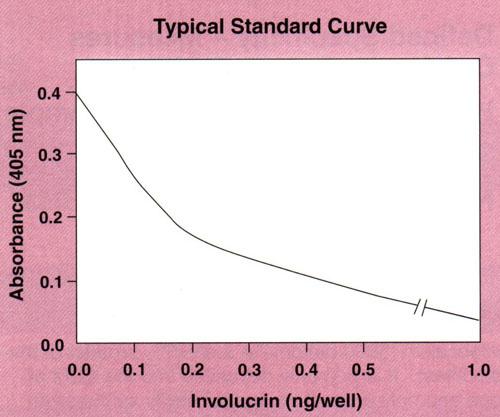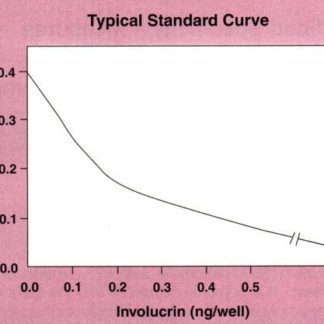Involucrin Elisa Kit
About The Assay
Involucrin, a soluble cytoplasmic protein with a highly repetitive amino acid sequence, serves as a substrate for transglutaminase cross-linking in the formation of cornified envelopes. Like the cross-linked envelope, involucrin expression is a specific marker for keratinocyte differentiation. This protein is synthesized not only by cells of the epidermis and other squamous epithelia, but also in epithelia undergoing squamous metaplasia and in certain tumors, as in the lung, which display epidermoid characteristics. In culture the growth and differentiation of keratinocytes, especially those derived from tumors, can be modulated greatly by physiological (retinoids, calcium) and toxic agents (including carcinogens). The involucrin content of the cells is highly responsive to such treatments and thus its measurement by ELISA can serve as a convenient and sensitive indicator of the cellular response.
The BTI Involucrin ELISA Kit is designed to provide a reproducible, quantitative method of measuring involucrin. The assay is highly sensitive, 0.05-0.5 nanograms per well. Levels of human involucrin can be directly measured after separation of cellular debris. The kit includes highly purified Human Involucrin, anti-Human Involucrin (rabbit) and Goat anti-Rabbit IgG Alkaline Phosphatase. A complete protocol is provided with each kit.
References
1. Walts, A.E. et al (1985) Involucrin, a marker of squamous and urothelial differentiation. An immunohistochemical study on its distribution in normal and neoplastic tissues. J. Pathol. 145: 329-340.
2. Eckert, R.L. and Green, H. (1986) Structure and evolution of the human involucrin gene. Cell 46: 583-589.
3. Parenteau, N.L. et al (1987) Primate Involucrins: Antigenic relatedness and detection of multiple forms. Proc. Natl. Acad. Sci. USA 84: 7571-7575.
4. Rice, R. H. et al (1988) Suppression of keratinocyte differentiation in SCC-9 human squamous carcinoma cells by benzo(a)pyrene, 12-O-tetradecanoyl phorbol 13 acetate and hydroxyurea. Carcinogenesis 9: 1885-1890.
5. Rubin, A. L. et al (1989) Coordination of keratinocyte programming in human SCC-13 squamous carcinoma and normal epidermal cells. J. Cell. Physiol. 138: 208-214.
6. Gaido, K.W. and Maness, S.C. (1994) Regulation of Gene Expression and Acceleration of differentiation in Human Keratinocytes By TCDD. Toxicol, & Applied Pharm. 127: 199-208.
Procedural Outline
1. Simultaneously incubate (4ºC) overnight Involucrin in Plate No.1, and Antibody + Standards or Antibody + Unknowns
in Plate No.2.
2. Transfer contents of Plate No.2 to Plate No.1. Incubate at room temperature 30 minutes.
3. Rinse Plate No.1, add GAR IgG Alkaline Phosphatase, incubate 1 hour at room temperature. Rinse and
add developing agent, incubate 1-4 hours.
4. Read Plate at 405nm.
Kit Components (1 vial each)
1. anti-Human Involucrin (rabbit)
2. Human Involucrin
3. Goat anti-Rabbit IgG Alkaline Phosphatase Conjugate.
BTI Involucrin ELISA Kit
Catalog No: BT-650
(sufficient for 2500 tests or 25-96 well plates)
Quantity: 1 kit
FOR RESEARCH USE ONLY. NOT FOR USE IN HUMANS OR AS AN IN-VITRO DIAGNOSTIC.
Buy now
All prices shown are exclusive of VAT

